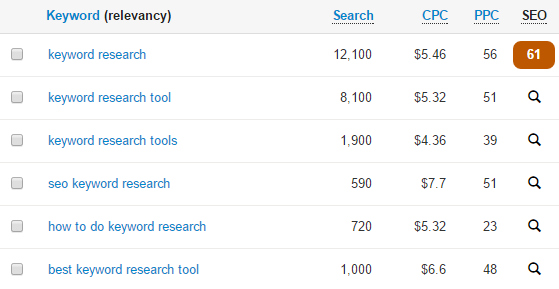
Let’s be honest here…it’s an essential pain in the butt.
I’m talking about keyword research.
If you’re doing search engine marketing, you can’t gloss over it. Those keywords form the foundation of your PPC and SEO campaigns. Pick the wrong keywords, and you’re not gonna have much success.
There are plenty of keyword research tools a search engine marketer can choose from. There’s the free Google Keyword Planner that’s included in the AdWords interface.
There are also paid tools such as Wordtracker and Keyword Discovery that provide some different data than Google’s tool and tend to be better at uncovering some long-tail keywords.
Then there are tools like iSpionage (which I actually find the most helpful in crafting an initial keyword list, and, no, I don’t work for them other than writing paid posts for their blog) that reveal what keywords your competition are bidding on and ranking for.
All of these have their pros and cons, but there really is no ideal keyword research tool out there.
As far as drawbacks go, here are three of the main issues I encounter with the keyword research tools:
#1: The data they provide about traffic and estimated CPCs can be incredibly inaccurate. I’ve seen examples from the Google Keyword Tool where its traffic estimates for a keyword was different from the actual number by a factor of 5000! (And most tools based their estimates off of Google’s data).
CPC estimates are often way off as well since what you actually pay is highly dependent on factors specific to your AdWords campaign. It’s understandable that these tools can’t really give a good estimate of what your actual CPCs will be and should be treated as what they are—estimates.
#2: The Google Keyword Planner’s usefulness has seemed to be in decline over the years. One of the biggest drawbacks we’ve found is that it doesn’t do a good job finding some highly relevant (and high traffic) keywords in the results. That means unless you know specific keyword variations that are related to the seed keywords you’re basing your research around, you could miss out on a lot of potentially profitable keywords that are out there.
#3: There’s no keyword research tool on earth that can reliably tell you about an extremely important piece of the search engine marketing puzzle—conversions. Even a small difference between the singular and plural version of a keyword can have a big effect on how well it converts. (Not to mention that it’s really the landing page that plays the biggest role in conversions.) Because of that, it’s just not realistic to have a keyword research tool that can tell you how a keyword is going to convert in your situation.
So with all these drawbacks, what’s a search engine marketer to do?!
Well, there actually is one keyword research tool that can overcome ALL of the above shortcomings that the other keyword research tools have.
Its name?
Google AdWords.
Yep. AdWords isn’t just a way to drive leads and sales on your site. It’s the most accurate keyword research tool you have at your disposal.
Here’s how it can help you address the keyword research tool shortcomings we addressed above…
Getting Accurate Data
As mentioned above, keyword research tools can provide some highly inaccurate data about keywords.
This is especially true with local keywords. I’ve seen a number of examples of keyword + city name keywords (ie. Chicago plumber) that the research tools say get no traffic that actually get hundreds of searches per month!
So how can you use AdWords to help with this?
By running a “test” campaign (or getting data from your existing campaigns) that will tell you the actual search volume for your keywords.
One way to do this is through using Exact match keywords.
When you use Exact match keywords, in order for your ads to appear on the AdWords results, a searcher has to type that exact search query into Google.
So, if you have a specific keyword (or group of keywords) you want to get traffic data for, simply put the Exact match version of the word in your campaign, let it run, and see how many impressions it gets.
Just be sure to factor in Impression Share when doing your calculations. For example, if your keyword gets 100 impressions and has a 50% Impression Share, then there are actually 200 people searching for that term over the time you ran your experiment.
Google’s Broad Match Modifier (BMM) can also give useful data.
BMM keywords have a plus (+) sign in front of each word in your keyword phrase. This tells Google that each word with a plus in front of it must appear in a search query in order for your ads to appear. (This can include misspellings, singular/plurals, acronyms, abbreviations and stemming forms of the words with a plus in front of them.)
We use BMM quite often in AdWords campaigns, and it can come it quite handy, especially for local keyword research. Here’s how…
We may know a lot of people in the Chicago area are searching for the term “kitchen remodelers” and even “kitchen remodelers Chicago”. But how many are searching for “kitchen remodelers Naperville”, “kitchen remodelers 60611”, etc.?
Again, the keyword research tools often don’t have very accurate data on local keyword variations like this.
But by adding a BMM keyword to your campaign like +kitchen +remodelers you’ll get data on all the variations people are typing into Google (just be sure you geographically limit your campaign to Chicago, or whatever area you’re trying to target!).
When we find search terms that are getting a fair amount of traffic, we’ll do two things with them.
First, we’ll add them as BMM or Exact match to our AdWords campaigns.
Second, in some cases, we’ll add more pages/content to the website focused on that keyword to try to rank better organically.
(Quickly, before we move on, I’ve got an advanced strategy for you here. If you’re just running a campaign to get keyword traffic data… write horrible ad copy! The more boring and generic your ad copy is, the fewer people will click on it and the less your test is gonna cost you!)
Finding “Hidden” Keyword Variations
If you’re looking to uncover those “hidden” variations of keywords that the keyword research tools may not find, there are two match types to stick to.
The first is the Broad Match Modifier we just talked about. If you use it as described above, you may find some great variations of your keywords when you review your Search Query report (this report shows you the actual search terms someone typed into Google before your ads were shown).
The other match type to use is Broad Match.
Google defines Broad Match like this: “With broad match, your ad may show if a search term contains your keyword terms in any order, and possibly along with other terms. Your ads can also show for close variations of your keywords.”
Now we usually don’t use Broad Match keywords in campaigns because they’re a great way to spend a lot of money with little to show for it in return.
However, when it comes to keyword research, Broad Match does have its place. Because you’re leaving more up to Google when it comes to what search queries to show your ads for, Broad Match keywords can show up for some search queries you’d never considered. Now, a lot of the time, that’s not a good thing. But you can discover some keyword gems this way.
The important thing to remember when using Broad Match is you have to keep a close eye on your search query report. When you see search queries that aren’t related to your business, add them to your campaign as a negative keyword to cut down what you spend on irrelevant clicks.
(Note: A “negative” keyword keeps your ads from being displayed for any search query that has one of your negative keywords in it.)
Determining if a Keyword Converts
This one’s pretty simple. There’s no tool around that’ll show you how a keyword converts for you or your competitors.
As mentioned earlier, different keyword variations can convert differently. And if, for example, “swimming lesson” converts much better than “swim lessons”, wouldn’t you like to know that BEFORE you invest in SEO for those keywords?
With AdWords you can do that. Just start sending traffic from the keyword(s) you want to test to your site. And be sure to use Exact match to carefully control the searches your ads appear for. At that point it’s simply a matter of being sure you have good conversion tracking in place and seeing which keywords convert the best.
A Few Important Considerations When Using Adwords For Keyword Research
As they’re prone to do, Google recently changed the way they treat Exact match keywords (Phrase match, too). Now search queries that include plurals, misspellings and other “close variants” of your Exact match keywords could trigger your ads.
This is an unfortunate change that Google really should give advertisers the option to opt out of. But they’re not doing that any more. What this means is you have to keep a closer eye on your Search Term report and add a lot more negative keywords to your ad groups and campaigns.
Another thing I’d recommend when using AdWords for keyword research is to create separate campaigns for your testing. Poorly performing keywords can negatively affect the rest of the keywords in the same campaign and you don’t want that to happen. So create a separate keyword research test campaign so your tests don’t affect any of the campaigns you’re optimizing to drive leads to your site.
Selecting the right keywords for your search marketing campaigns is one of the big keys to your success. Keyword research tools may give you some of the information you need, but by tapping into Google AdWords’ keyword research capabilities, you’ll get your hands on the most accurate data around.
Author
 Adam Kreitman coaches business owners on how to make their websites more compelling to their prospects…and to Google. He owns Words That Click, a firm specializing in Conversion Optimization and managing Google AdWords campaigns for small businesses. Follow him on Google+.
Adam Kreitman coaches business owners on how to make their websites more compelling to their prospects…and to Google. He owns Words That Click, a firm specializing in Conversion Optimization and managing Google AdWords campaigns for small businesses. Follow him on Google+.







